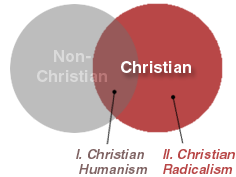Christian Humanism and Christian Radicalism
To experience the full richness of Christ we need to live both his natural and radical qualities. Typically we are open to one, but oblivious to the other.

Thoughts, words and actions can be identified as Christian or non-Christian. (Determining the degree of overlap is left as an exercise to the reader!)
- The area in common (the football-shaped slice), let's call "Christian Humanism," which includes things like going to the theater or bearing a child. And this would include any and everything of non-Chritian religions that really has God in it.
- The area uniquely Christian (the right moon-shaped slice) let's call "Christian Radicalism," which includes things like sharing your faith in Jesus or praying to Jesus—things which appear "radical" to non-Christians.
-
(The gray moon-shaped area is "sin" and includes what Christ
never does.)
Let's explore both Christian Humanism and then Christian Radicalism.
I. Christian Humanism
Christian Humanism is the recognition of God present in humanity. Because Jesus is 100% God and also 100% man, human-ness is not something we tolerate, but something with designed excellence, reflecting God's image, and activated with divine life through Christ.
So, we shouldn’t think "when I get to Paradise I'll shed my body
and evolve into a mystical consciousness." Jesus promises us a transformed,
glorified, organic existence, as he is now! The creation, incarnation
and resurrection endorse the physical creation; perfected in a Heaven that offers holy sensuality (literally "of the senses").
How does this have practical value? There is a danger that we will
miss out on profound experiences of Christ through our natural humanity and
through things that aren't uniquely identifiable as "Christian."
 A
person who disregards their humanity can be said to suffer from "super-spiritualism"
which means emphasizing spiritual things to the exclusion of physical
things. (The prefix "super" is not used in the sense of excellence,
but is a sarcastic term.) Though God will never sacrifice a spiritual good for a physical
good, that doesn't mean that the physical world is valueless. Its value is
simply subordinate, the back half of the same coin.
A
person who disregards their humanity can be said to suffer from "super-spiritualism"
which means emphasizing spiritual things to the exclusion of physical
things. (The prefix "super" is not used in the sense of excellence,
but is a sarcastic term.) Though God will never sacrifice a spiritual good for a physical
good, that doesn't mean that the physical world is valueless. Its value is
simply subordinate, the back half of the same coin.
So, what are clues we’re being superspiritual? It might be present if:
- We neglect exercise and sports because they are "unimportant."
- We cannot be social in an environment that isn't explicitly Christian.
- We suppress our emotions, rather than steer them.
- We make broad, overly-judgmental generalizations about society's corruption.
- Christian radio and books take priority over Christian relationships.
- We neglect development of our intellect because "all we need is faith."
- We downplay physicians because we think it indicates a lack of faith.
- We cannot relax or enjoy life because "there's too much service to be done."
- We don't see our job as important to God's because it's not a direct ministry.
- We love "humanity" as a concept, but don't love the person right next to us.
- We easily believe Christ is in Heaven; but not inside ourselves—right now.
- We view Heaven more in terms of bright lights than a large, real, tangible flesh-and-blood family.
To remedy superspiritualism, pray about the humanity of Jesus. Also, prioritize
time for sports, art, music and good reading. Lighten up and emphasize relationships
over religious tasks. Your humanity is not just earthly baggage until you
reach Heaven. It’s God's intentional design. The Bible says your body
is where the Holy Spirit dwells, the temple of God; so getting in touch with
humanity is a key way God manifests Himself. There are many ways to profoundly
experience God in the natural: through your spouse, friends, children, walks
in the country, etc.
Consider this. Why did Jesus have to walk from town to town? Didn't he have
enough faith for the Father to "beam" him over? Silliness. If his
life were only supernatural Jesus would've denied his own human nature and would reduce God's image. He
did many things not unique to Christianity: He was a carpenter. He attended
weddings, dinners, feast days. He wept, became tired, grew in wisdom, drank
wine and played with kids. We are to live a sensual life, in a holy way.
Jesus is our model. Now let's experience another side of him.
II. Christian Radicalism
God is profoundly available in natural human activities (e.g, birthdays,
shopping, vacations, etc.) However, if our Christianity
is limited to this, we're missing out on the higher dimension of God's blessing.
(And why be Christian?)
In the Sermon on the Mount Jesus repeatedly promises rewards in Heaven when
we go beyond the natural. "If you love only those
who love you, where is your reward? Don’t the unbelievers do that?" To do only the natural offers no permanent reward from God. We must also be unnatural, courageous, even heroic—to live the love of God.
Examples?
- Taking a risk based on what God spoke to you in prayer.
- Fasting.
- Experiencing charismatic gifts (e.g., praying in tongues, prophecy, visions).
- Being able to suffer joyfully because of your trust in God.
- Sharing Christ in you with others.
- Expelling evil spirits.
- Loving those you’re not naturally drawn to because Christ is in them.
- Giving with no expectation of reward until Heaven.
- Taking any action based on a promise that Jesus made in scripture, such as the reward for visiting those in prison because Christ is in them.
Often we seek radical blessings without a radical investment. There's a price. The apostle Paul says genuine Christians are viewed as "fools for Christ," "scum of the earth," and the "refuse of the world." In fact, the word "church" in Greek (ekklesia) means "called out of" or "set apart from."
Those neglecting all things radical are called "carnal" which prioritizes the flesh over the Spirit. A carnal Christian sacrifices eternal goods for temporal ones. Yet my life shouldn’t make sense unless it’s clear that I'm investing in Heaven.
True
Christianity is impossible without it. In fact, "radical" actually means "getting to the root."
Love is proved when we have
to sacrifice comfort. However, with God radical investment
brings radical rewards. Is that true? What does your experience indicate?
Summary
 A winemaker strives for excellence by properly blending
the softer elements (fruit, sweetness) and the harder elements
(acidity, tannin, etc.). Fruit without firmness,
tastes flimsy like Kool-Aid; firmness without fruit tastes lifeless and unattractive. God artfully produces a full, pleasing blend; Christian
Humanism flavors life, while Christian Radicalism brings it strength.
A winemaker strives for excellence by properly blending
the softer elements (fruit, sweetness) and the harder elements
(acidity, tannin, etc.). Fruit without firmness,
tastes flimsy like Kool-Aid; firmness without fruit tastes lifeless and unattractive. God artfully produces a full, pleasing blend; Christian
Humanism flavors life, while Christian Radicalism brings it strength.
- A radical-only Christian may wonder why certain personal needs aren't being met, despite valiant faith and efforts—why life lacks color and joy. Often this is simply a need to be more human, real, practical, and down-to-earth in the faith, aware of God in the natural.
- A humanist-only Christian may wonder why he doesn't experience more miracles, such as physical healings. Often he lacks radical commitment, especially when it appears foolish. If we are willing to do the ridiculous, God is ready to do the miraculous.
How should one emphasize these two areas in day-to-day living? This can only come through Jesus in daily prayer. Christianity is a relationship.